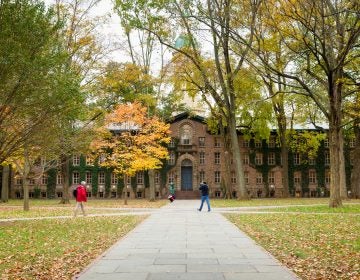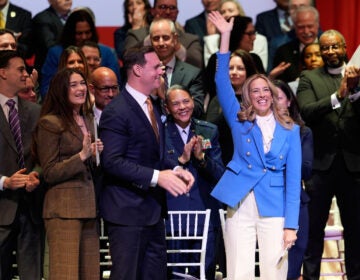Christie administration told it cannot raid affordable housing funds for other uses

The Ethel R. Lawrence Homes was the first affordable housing complex built in the suburbs under the Mt. Laurel Doctrine. (Mark Lozier/Fair Share Housing Development)
A New Jersey court has again slapped the Christie administration over its handling of affordable housing, this time preventing the state from taking as much as $200 million in municipal funds meant to build homes for low- and moderate-income residents.
The ruling by the Appellate Division of Superior Court settles the question that arose nearly three years ago when Gov. Chris Christie’s budget essentially sought to use the money held in trust funds for municipalities to build affordable housing to help balance the state budget. Fair Share Housing Center sued to stop the state from seizing the money.
In its decision issued on Thursday, an appellate panel stated that neither the state Council on Affordable Housing nor any part of the executive branch can take the funds. Following the lead of the Supreme Court, which last month took authority over affordable housing decisions away from COAH and put it back in the hands of the courts, the appellate judges ruled that the courts will also determine the fate of individual municipalities’ funds.
“The future disposition of the trust funds will be directed by our courts on a case-by-case basis” due to “COAH’s abject failure to adopt the regulations” governing the expenditure of the money in the funds, the decision states.
“Towns and nonprofits throughout the state can now move ahead with plans to build homes we need,” said Kevin Walsh, the Fair Share attorney who argued the case. “Thousands of homes will be built and rehabilitated using these funds.”
It’s unclear whether the state will appeal the ruling. Neither COAH nor Christie’s office returned requests for comment.
Christie first proposed taking the money in 2012, but the appellate division stopped the seizure, saying only COAH could act to take the money. The council finally met 10 months later and voted to begin the process of taking the funds. But an appellate judge again stayed the state from appropriating the money.
Fair Share, joined by the New Jersey State League of Municipalities, Affordable Housing Professionals of New Jersey and South Brunswick, argued that municipalities had not been given a fair chance to spend the funds because COAH never wrote rules directing how the money, generated from a fee on nonresidential developments, would be spent.
A 2008 revision to the Fair Housing Act provides that any municipal housing funds that a municipality has not committed to spend within four years can revert to the state’s affordable housing trust fund. The reasoning behind this was that if a municipality was balking at building homes for low- and moderate-income residents — and there are communities that have refused to participate in the COAH process, when it was functioning — the money could be used to provide housing in the same region through the state fund.
But Fair Share and the others argued that municipalities didn’t have a chance to spend the money because COAH did not write rules for its expenditure, as required by the 2008 law. Walsh argued in court in 2013 that municipalities could not spend trust fund money without approval from COAH and for a time COAH was not meeting and approving plans. After COAH gave its director the power to approve spending plans and some were okayed, it was with the caveat that the approval did not constitute “a commitment to expend money within four years from the date of collection.”
The appellate division agreed with that assessment.
“Despite the Legislature’s clear and unambiguous direction that the Council on Affordable Housing (COAH) promulgate regulations defining when affordable housing trust funds are committed, and despite previously expressing its intention to comply with that command, COAH has failed and refused to adopt regulations, leaving municipalities in a morass of uncertainty while facing the prospect of an arbitrary seizure of affordable housing trust funds.”
Appellate Judge Clarkson S. Fisher, Jr. for the court.
The decision notes that COAH’s director in 2008 had written to mayors about the regulations to come. In 2012 the commissioner of the Department of Community Affairs — acting during a time period in which Christie had eliminated COAH by executive reorganization, only to have the Supreme Court rule Christie had overstepped his authority — was writing regulations but these were never adopted. And the Legislature passed a bill extending the deadline for municipalities to spend trust fund money and inserted into the budget a definition of the term “commit to spend” the money, only to have both of those vetoed by Christie.
It flat out rejected COAH’s assertion that “no regulations are needed” to govern the spending of the trust funds, stating that this “is not a serious response to the problem at hand.” And it further rejected the argument that the Legislature’s 2008 law was explanation enough of the term “commit to spend” money, saying that contention “is unworthy of further discussion.”
Fisher wrote, “The simple fact is that COAH has ignored the considered wisdom of our Legislature by failing to promulgate rules.”
While the judges wrote that leaving the determination of whether trust funds have been committed to be spent up to the courts is not an ideal scenario, it is the most logical and “only available” one, given the Supreme Court’s ruling last month that declared COAH “moribund” and gave the courts the power to determine municipal affordable housing obligations.
There is still a question of how much money is at stake.
Walsh said that last year that between $30 million and $40 million was approved as “committed,” and the estimated total in the balances was $160 million in July 2012, so he estimates the total at $200 million.
The most recent accounting on DCA’s website lists balances, self-reported by municipalities, as of July 17, 2012, with a total of $129 million spent between July 2008 and July 2012 and $142 million unspent as of that date. Data from Fair Share shows that $231 million had been spent prior to July 2008.
There are significant amounts in some of the funds — $10.8 million for Marlboro, $9.7 million for Monroe in Middlesex, and $7.8 million for North Brunswick. In total, 368 municipalities had no money left, meaning they either already spent it or had not received any funds in the first place.
Walsh said there is additional money coming into the funds “from some sources but we don’t have access to how much.”
Sharon Barker, vice president and chief operating officer of the Housing and Community Development Network of New Jersey, applauded the ruling.
“Everyone should have the opportunity to live in a great community, in a home they can afford and each dollar is an investment in the future of our communities and our residents. The municipal housing trust funds are essential funding mechanisms for that purpose,” she said. “These trust funds are intended to help people who need homes and jobs in our state. We commend the Court for making this ruling and ensuring that dollars raised locally, stay local. New Jersey residents need and want affordable homes and today’s ruling allows communities to meet those needs.”
While in favor of the ruling, the League of Municipalities continues to urge reform of the Fair Housing Act, including incentives for communities to use the trust funds.
The decision is narrow, based on the specifics of the COAH housing money, and has no bearing on the hundreds of millions of dollars Christie has taken from other funds to balance his budgets. The administration, with legislative approval, has diverted more than $1 billion in clean energy funds and tens of millions more meant for recycling and landfill cleanups to plug holes in past budgets. The current budget also includes a provision to take $120 million from a settlement with a company over dioxin contamination in the Passaic River. Next year’s budget plans, among other diversions, to use $20 million in corporate business taxes dedicated for open space to instead pay state park personnel’s salaries.
____________________________________________
NJ Spotlight, an independent online news service on issues critical to New Jersey, makes its in-depth reporting available to NewsWorks.
WHYY is your source for fact-based, in-depth journalism and information. As a nonprofit organization, we rely on financial support from readers like you. Please give today.




